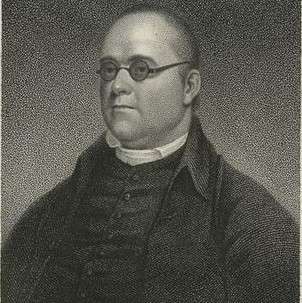REVIEW POTPOURRI: Rev. Timothy Dwight
 by Peter Cates
by Peter Cates
Rev. Timothy Dwight
During the late 1980s to early ’90s, I taught American lit survey classes for the Houston Community College System in the Lone Star State and used the humongous two-volume Harper American Literature anthology, each consisting of 2,500 pages. Being a bit obsessive compulsive curious about anything and everything, I read through both volumes over a 15-year period and encountered several lesser known literary figures, along with the classic legends such as Thoreau, Washington Irving, Walt Whitma , Hemingway etc., whose writing was also of interest.
Two such individuals were based in Connecticut for most of their lives. The first was the very formidable Reverend Timothy Dwight (1752-1817), who wrote prolifically, established a private coed school, worked two farms, and eventually became president of Yale University.
The reason for using ‘formidable’ has its roots not only in Dwight’s personality but in 18th century Connecticut society. The authoritarian Calvinistic Puritanism that prevailed in Massachusetts during the 17th century had waned by the end of the 1692 Salem witch trials and the Bay State had become a more mild-mannered society with a more easy going governing world view while Puritanism had transferred its base of operation to Connecticut.
This theocratic influence was so insidious that, when Thomas Jefferson became president in 1801, church women in the state were burying their Bibles in the backyard because they considered him a dangerous apostate.
Meanwhile, Timothy Dwight had been born and raised in Northampton, Massachusetts, and was the grandson of the preacher Jonathan Edwards, an unreconstructed Puritan whose own claim to fame was the frequently anthologized Sinners in the Hands of an Angry God (which I studied as a teenager at Kent’s Hill and, 20 years later, taught in Houston.).
Back to Dwight’s own formidable personality. Like his grandfather, he was an absolutist of the Puritan faith and became a very popular preacher among the Puritans in Connecticut. Stubbornly unwavering and dogmatic, he ranted and railed against even the tiniest specks of what he considered heresy in a most pushy, heavy-handed manner.
Even his best friends were at times intimidated by him and referred to him as the “Protestant Pope of New England.”
The 20th century historian Vernon Parrington commented that Dwight’s “mind was closed as tight as his study window in January.”
Paradoxically, Dwight was an innovator in education and, upon assuming the presidency of Yale, expanded the University’s curriculum to courses in “modern” literature, languages, geography, medicine, chemistry, etc.
While president, Dwight undertook a number of research journeys through New England and New York State, from 1795 to 1815, to study anything and everything that attracted his curiosity within its constricted parameters and to take painstakingly detailed notes. The results were collected after his death into four volumes, Travels in New-England and New York, and published in 1821 and 1822.
As an example, Dwight visited several upper class families in Boston and wrote some particularly trenchant observations on the methods by which such parents were raising their children, comments that might be perceived as relevant to families in more recent years:
“The end proposed by the parents is to make their children objects of admiration. The means, though not sanctioned, are certainly characterized by the end. That I have not mistaken the end may be easily proved by a single resort to almost any genteel company. To such company the children of the family are regularly introduced, and the praise of the guests is administered to them as regularly as the dinner or the tea is served up. Commendation is rung through all its changes; and you may hear, both in concert and succession: “beautiful children, ” “fine children, ” “sweet children, ” “lovely children,” “what a charming family!” “what a delightful family!” “You are a fine little fellow.” “You are a sweet little girl.” “My son, can’t you speak one of your pieces before this good company?” “Caroline, where is your work?” “Susan, bring Miss Caroline’s work and show it to that lady.” “Susan, bring with you the picture which she finished last week;”…..Were you to pass a twelve month in this country, and to believe all that you heard said by people not destitute of respectability, whatever opinion you might form of the parents, you would suppose that the children were a superior race of beings, both in person and mind; and that beauty, genius, grace, and loveliness had descended to this world in form and determined to make these states their future residence…Children educated in the manner to which I refer soon learn that the primary end of their efforts, and even of their existence, is ‘appearance only. What they are,’ they soon discern is of little consequence; but, ‘what they appear to be’ is of importance inestimable.”
Responsible journalism is hard work!
It is also expensive!
If you enjoy reading The Town Line and the good news we bring you each week, would you consider a donation to help us continue the work we’re doing?
The Town Line is a 501(c)(3) nonprofit private foundation, and all donations are tax deductible under the Internal Revenue Service code.
To help, please visit our online donation page or mail a check payable to The Town Line, PO Box 89, South China, ME 04358. Your contribution is appreciated!



Leave a Reply
Want to join the discussion?Feel free to contribute!